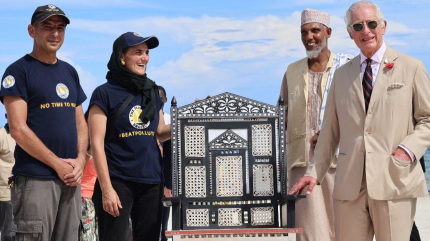
Kenya is becoming a centre for plastic innovation and packaging development, attracting companies such as Nexgen Packaging to establish its headquarters there. International giant Coca-Cola now has plans to invest $175m in the country up to 2029.
Bolstering this national innovation is the East African movement, the FlipFlopi Project. At the centre of the organisation’s mission to end single-use plastic is its dhow – the world’s first sailing vessel to be made of recycled plastic.
Since 2018, FlipFlopi has used the dhow to convene policy-makers, communities and plastic entrepreneurs to raise awareness and demand legislative action to ban single-use plastic across the region.
Programme manager Davina Ngei tells Packaging Gateway about the organisation’s operational strategy – underpinned by the pillars of education, innovation and influence to drive a circular economy in East Africa.
Combatting plastic waste on remote islands
FlipFlopi is based on Lamu Island, just off the Kenyan coast in the Indian Ocean.
Ngei explains that the goal is to “create a circular economy for plastics in a geographically remote area, where it is commercially challenging for recyclers to invest and there’s limited waste options for the community.”
The challenges of this location are “unique” according to Ngei. “We’re dealing with transport challenges and the logistical costs of bringing plastic from different islands. A significant amount of waste also comes from mangroves and beaches and we face regular power outages.”
Due to restricted movement and investments, some collected materials have to be sent to the mainland to one of the larger recyclers in the big cities.
“There are large volumes of packaging on the island. Some is multi-layered and some is single-use. This is something that we’re struggling with,” Ngei explains.
PET (polyethylene terephthalate) and flexible packaging make up a significant portion of plastics in the Lamu archipelago. In 2023, 39,150 kgs of PET were crushed and transported off the island to other recyclers.
Through the support of the UK Development Aid SMEP Programme, FlipFlopi now employs a team of 30 workers and has invested in infrastructure across the islands to source, collect and store plastic waste properly.
Encouraging recycling
FlipFlopi is built on a community-centred circular solution. Ngei confirms that “it’s not just about managing plastic pollution. We’re trying to create behaviour change within communities, while also preventing pollution from happening in the first place.”
With cash incentive systems, people are encouraged to retain the plastic packaging they have in their households and give it in for collection, discouraging improper disposal methods.
Ngei says that the burning and dumping of waste is “quite common” around Lamu. FlipFlopi attempts to redirect these practices so that even if waste ends up in landfill, this is preferable to informal dumping and burning.
Creating heritage products out of recycled materials has also proven to be an effective way to engage communities. FlipFlopi has handcrafted a Swahili kiti cha enzi (throne) made of 100% recycled plastic which was presented to King Charles during his tour of Kenya in 2023.
“The community becomes heavily involved in creating and benefitting from something that has real value and is meaningful to the people of the land,” states Ngei.
She emphasises that for every 1000 tonnes of plastic that FlipFlopi recovers, an additional 24 years of life is added to the population of the local shoreline community.
To put this into perspective: in 2023, FlipFlopi recovered 149,049kgs of post-consumer plastics in the Lamu archipelago, avoiding 136,390 kg of CO₂-equivalent emissions. 22,464kg of this was converted into plastic planks.
The organisation also operates a vocational training centre in Lamu to educate young people on different aspects of the circular economy and provides apprenticeships for building and carpentry work that uses plastic lumber.
Holding the packaging industry accountable
As FlipFlopi continues to collect packaging waste, Ngei highlights the rise in “poor quality packaging on the markets.”
“Unfortunately, there’s a lot of companies claiming their packaging is recyclable but there’s a lot of mixed polymers, which makes recycling almost impossible.”
She urges the packaging industry to establish more consistent production of items that last, but acknowledges that there are regional differences in regulations and material usage.
FlipFlopi also looks to stakeholders and packaging companies to aid policy development in Kenya, which has strong laws on plastic consumption and production. The 2022 Waste Management Act imposes mandatory extended producer responsibility obligations on every producer, who will be responsible for the post-consumer stage of product life cycles.
FlipFlopi has scaled its regional advocacy efforts to build consensus across seven East African Community member states on the adoption of a regional bill. If adopted, this bill will direct a total ban on unnecessary single-use plastics in these member states.
Ngei asserts that “stricter and more transparent regulation will lead to better enforcement and encourage more investment within the circular economy sector. This will provide a clear vision for Kenya’s waste management landscape.”
FlipFlopi will continue to work towards its vision of establishing a zero-waste island, grow its revenue streams as a grant-dependent project, and expand its processing capacity to provide its services to a wider population.



